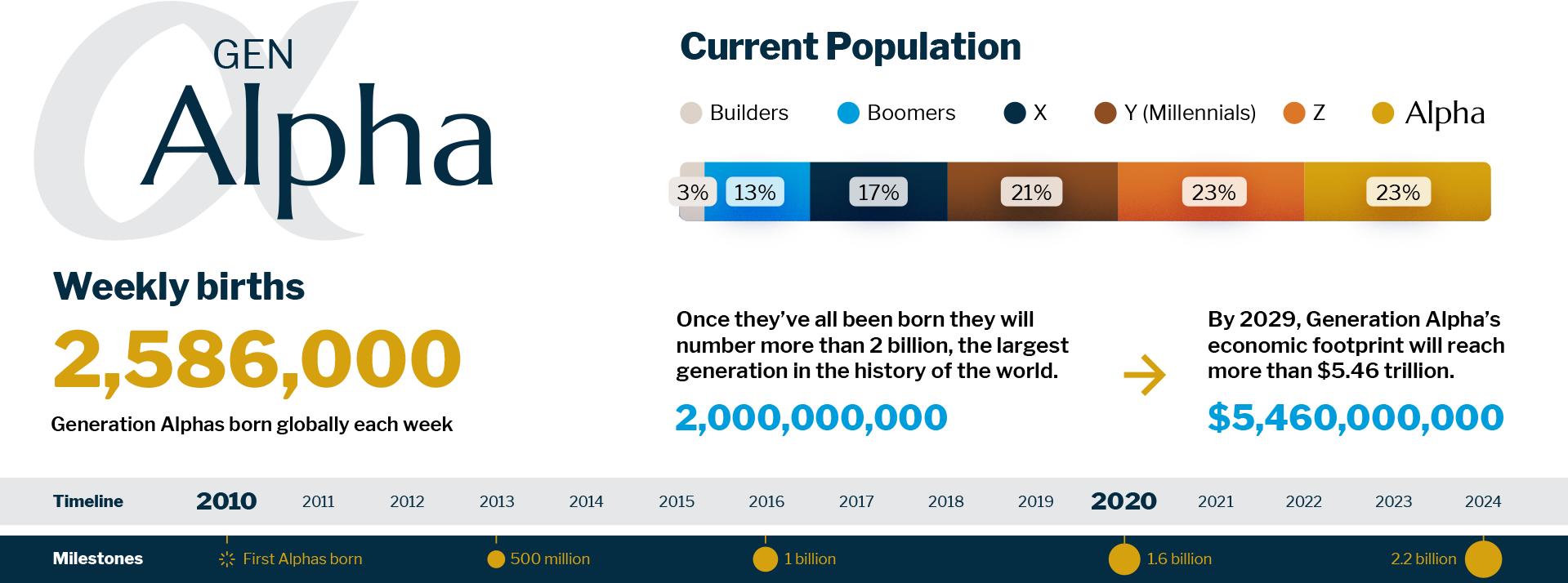Meet Gen Alpha
Born between 2010 and 2025, Gen Alpha will soon be the world’s largest generation in history, with their total numbers expected exceed 2 billion. What do we know about them?


“Screenagers”
Since birth, digital screens have been ubiquitous for Gen Alpha. The iPad was first introduced in 2010, and Gen Alpha is growing up with continuous exposure to the Internet, social media, streaming entertainment, and instant answers from the likes of Apple’s Siri and Amazon’s Alexa. Through their parents use of social media, they may find themselves with an online presence before even starting school.
Social Media Madness
With such early exposure to devices such as iPads and smartphones, Gen Alpha is naturally tech-savvy, easily able to take advantage of the abundance of entertainment and education options available through these touchscreens.
But the abundance can come with a cost. High levels of social media use among Gen Alpha in such formative years can easily lead to a number of issues, including impaired social formation, anxiety, low attention span, eating disorders, and more. These kids can face cyberbullying and harassment, making them feel alienated and forcing them to grow up faster.
Generation COVID
Although it’s still too early to know the long-term effects of the 2020 COVID pandemic, it certainly had a profound impact. It forced many Gen Alpha kdis to use computers and digital screens all the more for schoolwork, while the social isolation took a toll. Many saw their parents’ lives equally disrupted by the pandemic, sometimes leading to permanent shifts in their work habits and the habits of family life..
Diversity and Economic Inequity
Gen Alpha is set to be the most racially and ethnically diverse generation in the country yet, with the white population at less than 50%. Generation Alpha has also experienced higher poverty rates compared to previous generations due to being born between two economic crises (the 2008 recession and the 2020 pandemic), and nearly one in five kids of Gen Alpha are living below the federal poverty level. Financial inequities by race and ethnicity have also widened since 2010, and these gaps do not seem likely to improve anytime soon.
Reimagining Education
As Millennial parents become more involved in their children’s education, there is growing pushback against formalized education systems. These parents, who grew up in a time of rapid technological advancement and societal change, may have a more open-minded approach to education with the many resources that modern technology makes available.
This mindset is also fueled by the rise of the gig economy, remote work, and the increasing importance of skills over degrees in the job market. With this shift in thinking, Millennial parents may encourage their children to explore different interests and skills outside of traditional education systems, paving the way for a new definition of success for their children and future generations.
Sources
For further reading, check out these informational sources:


